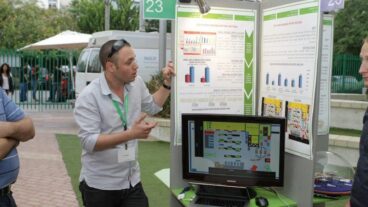BGN helps university faculty ‘translate’ their inventions and academic achievements into commercially valuable products.B.G. Negev Technologies and Applications Ltd., the commercial arm of Ben-Gurion University, is not only making the Negev bloom as envisioned by Israel’s first prime minister David Ben-Gurion. It’s also putting the southern desert region on the international map as an important center of applied research.
One B.G. Negev project involves a BGU researcher who has succeeded in creating human monoclonal antibodies which can neutralize the highly contagious smallpox virus without inducing the dangerous side effects of the existing vaccine.
Another BGN project will reduce the frequency of power supply disturbances that play havoc with consumer electronic devices.
These and other novel technologies discovered or invented at the university provide BGN with a broad range of products from fields as diverse as biotechnology, pharmaceutics, medical diagnostics and microelectronics. Much of the research and development at the University is performed within its interdisciplinary research centers, which include the Institutes for Applied Research, the Jacob Blaustein Institute for Desert Research, the Ben-Gurion Research Center, the Institute for Applied Biosciences, and the new Center for Meso and Nanoscale Science and Technology.
“Our job is to serve as a link between industry and academic research,” Dr. Ora Horovitz, Vice President of Business Development at BGN, told ISRAEL21c. Horovitz, a molecular biologist, was involved in product development for eight years before she took on the job of technology transfer.
“BGN helps university faculty ‘translate’ their inventions and academic achievements into commercially valuable products. We facilitate technology transfer to existing companies or create new startup companies.”
A $3 million Biotech/Pharm Fund managed by BGN helps to transfer inventions and innovations from the lab to the marketplace. In the last three years, two of the 11 projects funded have already been commercialized and another three are under negotiation. BGN’s ongoing business contacts include major Israeli and international companies Teva, Elop, Dead Sea Works, Ares Serono, GE, IBM, Intel, Motorola, Israel Military Industries, Compugen, Nur Macroprinters, Nice, Frutarom, and Estee Lauder.
“The continuous flow of ideas and innovations from BGU’s faculty and students provides BGN with a gold mine of new business opportunities,” said Horovitz.
Here are just two examples:
Bio-defense: Virologist on the Front Line
“My goal is to create a therapeutic arsenal of human antibodies against deadly viruses and untreatable disease,” Dr. Leslie Lobel, a scientist in the Virology Department of the Faculty of Health Sciences of BGU, told ISRAEL21c. “Before 9/11, no one listened when I talked about using human monoclonal antibodies against outbreaks of serious disease.”
Lobel notes that bio-warfare was used in the past in the US – during the French and Indian War, and the War of Independence. He contends that the 1995 film Outbreak with Dustin Hoffman, in which a deadly virus carried by a monkey from Africa demonized an American city, is not far-fetched.
Bio-defense related research is no longer being shrugged off. When Lobel talks about pro-active research, he no longer feels like a voice in the wilderness.
In cooperation with a New York-based biotech company and colleague Dr. Ilya Trakht of Columbia University, the U.S.-born scientist has succeeded in producing human monoclonal antibodies against the vaccine strain of the highly contagious smallpox virus.
Monoclonal antibodies are proteins that function in the body like guided missiles, homing in on a specific target – be it a virus, bacteria or other foreign invader. The antibody itself is benign and can be stored for a long time outside the body.
“The antibodies will neutralize the virus, and avoid the dangerous side effects of the existing vaccine,” said Lobel. Hopefully, these totally human monoclonal antibodies will be useful for treatment of smallpox itself in the event of an outbreak. Clinical trials are expected to begin within a year.
Lobel earned both his MD and PhD degrees at the College of Physicians and Surgeons of Columbia University, completed post-doctorate studies at MIT in Boston, and returned to Columbia, before immigrating to Israel in August 2002.
Lobel’s lab is also spearheading research to isolate monoclonal antibodies for West Nile Fever, Hepatitis C, as well as the deadly Ebola virus that killed hundreds in Uganda three years ago. “Ebola is the most lethal virus. It can kill 90% of those afflicted. And there is no therapy to counter it. There is a vaccine thus far tested in animals, but it takes a relatively long time to build immunity.”
On an expedition to Uganda, Lobel worked with the local Ugandan authorities to obtain large blood samples from Ebola survivors.
“Israel has a good reputation in Africa,” he said. Lobel, along with his long-time colleague Dr. Ilya Trakht, and another Columbia colleague Dr. Ian Lipkind, a Professor in the School of Public Health at Columbia University in New York, are collaborating on the search for the human antibodies that will neutralize the Ebola virus. His long-range goal is to create a Center for Emerging Infectious Disease at Ben-Gurion University.
Chip Gives Clean, Steady Power
Power supplies are at the heart of every electronic system. But spikes in the power supply and uneven flow of current consumed by your laptop, PC, microwave, audio system, or TV can ruin your equipment and damage the environment. Miniaturized equipment is especially dependent upon a steady supply of current. Power factor problems (caused by switching from AC to DC) cause overloads, voltage distortion, noise, and interference between components. Low PF (Power Factor) means less electrical efficiency, creating the need for larger generators, transformers, and other distribution devices.
One BGN project is a ‘plug and play’ technology that cuts the amount of circuitry and power needed to run electrical devices.
With government bodies requiring manufacturers to correct Power Factor inefficiency in environmentally unfriendly products, the market for Power Factor Correction is becoming very lucrative, with the Power Supply Market estimated at $12.2 billion.
More than 10 years ago, Professor Shmuel Ben Yaakov, a leading authority on Power Factor Correction, and two students in his lab in the Power Electronics group at BGU’s Department of Electrical and Computer Engineering, began working on an Integrated Circuit chip that would simplify the design of electrical devices.
“We knew there was a commercial need for Power Factor Correction,” said one of the students, Arkady Katz, who along with Ilya Zeltser, founded Green Power Technologies Ltd in 2001.
“Our aim was to prevent the problem and make it easier and faster for engineers to design appliances and equipment,” added Zeltser.
The startup has developed a family of integrated, minimized, matchbox-sized products that solve the problem of power conversion and the need for Power Factor Correction. Extra benefits: an electronics company gains a shorter time to market for a new product and production cost cutting.
The products are geared to manufacturers who have to comply with the new Power Factor standards requiring harmonic emission. These standards are not only becoming accepted in the U.S., but throughout the world. In-house solutions are time-consuming and hence, expensive. “Off-the-shelf solutions available on the market create heat dissipation which in turn requires another power-consuming device,” said Ben Yaakov.
The Green Power Integrated products are simple, reliable, easily implemented and low cost. A space-saver, one small unit replaces many others. Even a non-technical person can appreciate the difference in circuitry in GPT products as compared to competitor products (with a maze of circuits) that have emerged on the market. The built-in GPT Controller design uses less circuitry to connect equipment to a power line. Result: the robust chip provides better performance. Effect on the environment: less pollution.
Green Power Technologies has five patents in the United States, and last month
they announced a new controller module for products that require high power, in the range of 1 to 3.5 kilowatts. The unit is suitable for producers of plasma big screen TV’s, big network boxes, servers, and microwaves.
“The new module gives our customers the most advanced Power Factor Correction solution for high power applications,” said Eitan Cohen, Green Power Technologies’ CEO. “We provide a complete portfolio of integrated circuitry and modular PFC products covering the entire single phase power range and many different applications. We maintain our goal to be the most innovative company for Power Factor Correction solutions.”
(This is the first in a series of articles about Israeli university commercial arms)












